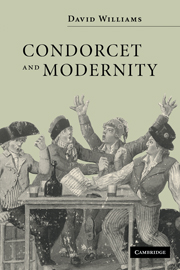Book contents
- Frontmatter
- Contents
- Acknowledgements
- References and abbreviations
- Introduction
- 1 Profile of a political life
- 2 Human nature and human rights
- 3 The civil order
- 4 Managing enlightenment
- 5 Reform and the moral order
- 6 New constructions of equality
- 7 Justice and the law
- 8 Representative government
- 9 The economic order
- 10 Managing the Revolution
- Conclusion: the human odyssey
- Bibliography
- Name index
- Subject index
5 - Reform and the moral order
Published online by Cambridge University Press: 22 September 2009
- Frontmatter
- Contents
- Acknowledgements
- References and abbreviations
- Introduction
- 1 Profile of a political life
- 2 Human nature and human rights
- 3 The civil order
- 4 Managing enlightenment
- 5 Reform and the moral order
- 6 New constructions of equality
- 7 Justice and the law
- 8 Representative government
- 9 The economic order
- 10 Managing the Revolution
- Conclusion: the human odyssey
- Bibliography
- Name index
- Subject index
Summary
AUTHORITY AND THE CHURCH
For Condorcet the political organisation of society was without purpose unless it was closely identified with the pursuit of human happiness, and embedded in a well-understood moral order of a strictly secular nature. Reference to the moral dimensions of human sociability provides one of the continuities that run through all aspects of Condorcet's thought on the management of public affairs, and characteristically consideration of morality in the modern polity is not confined to abstractions, but anchored to practicalities. Like equality and freedom, happiness was a concept with tangible, and therefore manageable, extensions in the real world of ordinary people's lives. Much of Condorcet's achievement as a political thinker and legislator derives from his understanding of the responsibilities of governments with regard to the moral implications and consequences of political decision-making:
By bringing men closer together, society increases the influence of each over the happiness of others, and while, strictly speaking, [civil] duties can be boiled down to justice, and namely to respect for the natural rights of others, duties of a different order must have arisen from that influence directing our conduct in ways that contribute to the happiness of others.
(V: 194)In the Vie de m. Turgot Condorcet expressed his admiration for a statesman familiar with the delicate balance between the moral and the political orders, and with the threat posed to that balance by a fanatical church
which, fired by speculative dogma, makes man's salvation dependent on his faith, treats the free use of reason as audacious impudence, and sets its priests up as tutors of nations and judges of morality. [Turgot] was quite aware that if the governments of Europe ceased to be enlightened, if they forgot just for one moment to monitor the activities of the clergy, if all educated, enlightened men …, in a word, all those whose opinions really govern the world, ceased to be united in a spirit of tolerance and reason, then the same causes would soon produce the same effects.
(V: 12–13)- Type
- Chapter
- Information
- Condorcet and Modernity , pp. 117 - 138Publisher: Cambridge University PressPrint publication year: 2004

